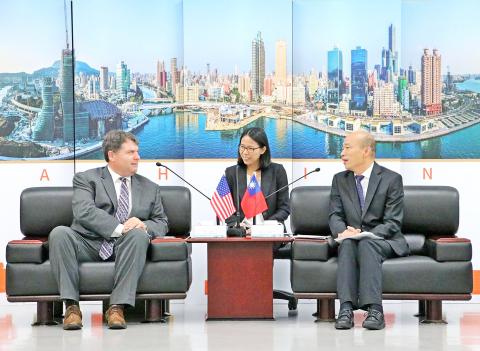Kaohsiung Mayor Han Kuo-yu (韓國瑜) yesterday said that if elected president, he would promote foreign policy aimed at bringing substantial improvements to the nation’s economy, instead of policy aimed at “saving face.”
During his weekly Facebook livestream, the Chinese Nationalist Party (KMT) presidential candidate criticized President Tsai Ing-wen (蔡英文) for her “shockingly strong” attitude on diplomatic issues, which he said has yielded laughable results.
Over the past three years, the Tsai administration has lost five diplomatic allies, and rumors suggest that the Solomon Islands could be next, he said.

Photo copied by Ko Yu-hao, Taipei Times
Meanwhile, seven of the nation’s representative offices abroad have been renamed or downgraded, he said.
Tsai’s foreign policy has led the nation on an “increasingly narrow and dangerous path,” he said.
“Currently, what is more important for Taiwan? Saving face or making substantial improvements?” he asked.
As president, he would promote foreign policy that focuses on trade and brings substantial improvements to the nation, he said.
His foreign policy would consist of three aspects: protecting local businesses, offering international medical assistance and providing a platform for young people, he said.
One of the ways Han would help Taiwanese companies would be to assign diplomats stationed abroad the additional role of being a promoter for Taiwan’s businesses and products, said Dale Jieh (介文汲), Han’s policy adviser and a former diplomat.
There are more than 100 Taiwanese diplomats stationed abroad with the experience, knowledge and connections to promote Taiwan’s products, he said, adding that the government only needs to provide them with more resources and objectives.
In addition to promoting Taiwan’s products, the diplomats could also help bring investors and technologies to Taiwan, Jieh said.
Han would also promote plans to offer assistance to other nations to improve their healthcare infrastructure, he said, adding that Taiwan has a leading healthcare industry.
As president, Han would also provide more support to international volunteer programs and international competitions for young people, Han’s campaign office said.
Han’s diplomatic strategy is in line with the mainstream approach in diplomacy worldwide, Jieh said.
“Foreign policy must be practical and realistic, rather than ideological,” he said.
Democratic Progressive Party (DPP) officials responded to criticism of the government’s foreign affairs policies after Han’s office said that the “abnormal cross-strait relations” since the DPP assumed power in 2016 were to blame for the arrest of Taiwanese by Chinese authorities.
DPP spokeswoman Hsueh Cheng-yi (薛呈懿) said that cross-strait relations with China “can only be built upon a foundation of democratic values, freedom, due process of law and human rights, to able to protect the lives of Taiwan’s citizens.”
“Han always blames the DPP for problems ... in dealing with China. This only highlights Han’s shallow understanding and his own abnormal concepts about the very complicated issues surrounding cross-strait relations,” Hsueh said.
From 2008 to 2016 when the KMT was in power, more than 600 Taiwanese were arrested by the Chinese government, he said.
According to Han’s logic, it could be said that former president Ma Ying-jeou’s (馬英九) tenure was also a period of abnormal cross-strait relations, Hsueh said.
“Starting in May 2016, Beijing used political issues as reasons to cut off meaningful dialogue and communication with Taiwan, and ravaged existing cross-strait agreements,” Hsueh said. “It is China who ignored and damaged the rights of the people on both sides of the Taiwan Strait.”
“Instead of pointing to China as an unprincipled, untrustworthy regime, which undermined agreements, and arrest our citizens arbitrarily, Han turns the blame on our government, which is incomprehensible to us,” Hsueh said.

Taiwan is stepping up plans to create self-sufficient supply chains for combat drones and increase foreign orders from the US to counter China’s numerical superiority, a defense official said on Saturday. Commenting on condition of anonymity, the official said the nation’s armed forces are in agreement with US Admiral Samuel Paparo’s assessment that Taiwan’s military must be prepared to turn the nation’s waters into a “hellscape” for the Chinese People’s Liberation Army (PLA). Paparo, the commander of the US Indo-Pacific Command, reiterated the concept during a Congressional hearing in Washington on Wednesday. He first coined the term in a security conference last

Prosecutors today declined to say who was questioned regarding alleged forgery on petitions to recall Democratic Progressive Party (DPP) legislators, after Chinese-language media earlier reported that members of the Chinese Nationalist Party (KMT) Youth League were brought in for questioning. The Ministry of Justice Investigation Bureau confirmed that two people had been questioned, but did not disclose any further information about the ongoing investigation. KMT Youth League members Lee Hsiao-liang (李孝亮) and Liu Szu-yin (劉思吟) — who are leading the effort to recall DPP caucus chief executive Rosalia Wu (吳思瑤) and Legislator Wu Pei-yi (吳沛憶) — both posted on Facebook saying: “I

The Ministry of Economic Affairs has fined Taobao NT$1.2 million (US$36,912) for advertisements that exceed its approved business scope, requiring the Chinese e-commerce platform to make corrections in the first half of this year or its license may be revoked. Lawmakers have called for stricter enforcement of Chinese e-commerce platforms and measures to prevent China from laundering its goods through Taiwan in response to US President Donald Trump’s heavy tariffs on China. The Legislative Yuan’s Finance Committee met today to discuss policies to prevent China from dumping goods in Taiwan, inviting government agencies to report. Democratic Progressive Party Legislator Kuo Kuo-wen (郭國文) said

Sung Chien-liang (宋建樑), who led efforts to recall Democratic Progressive Party (DPP) Legislator Lee Kun-cheng (李坤城), was released on bail of NT$80,000 today amid outcry over his decision to wear a Nazi armband to questioning the night before. Sung arrived at the New Taipei District Prosecutors’ Office for questioning in a recall petition forgery case last night wearing a red armband bearing a swastika, carrying a copy of Adolf Hitler’s Mein Kampf and giving a Nazi salute. Sung left the building at 1:15am without the armband and covering the book with his coat. Lee said today that this is a serious